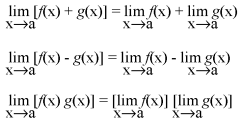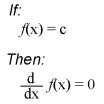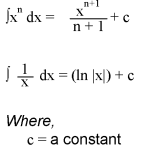| The ebook FEEE - Fundamentals of Electrical Engineering and Electronics is based on material originally written by T.R. Kuphaldt and various co-authors. For more information please read the copyright pages. |

|

Home  Reference Reference  Calculus Reference Calculus Reference |
|






|
|
|
Calculus ReferenceLimits, calculus
Derivative of a constant
("c" being a constant) Derivative of power and log functions
Derivative of e functions
Trigonometric derivatives
Derivative rules Constant rule
Rule of sums
Rule of differences
Product rule
Quotient rule
Power rule
Functions of other functions
Antiderivatives Integral, indefinite
Notice something important here: taking the derivative of f(x) may precisely give you g(x), but taking the antiderivative of g(x) does not necessarily give you f(x) in its original form. Example:
Note that the constant c is unknown! The original function f(x) could have been 3x2 + 5, 3x2 + 10, 3x2 + anything, and the derivative of f(x) would have still been 6x. Determining the antiderivative of a function, then, is a bit less certain than determining the derivative of a function.
Antiderivative of e functions
Note: this is a very unique and useful property of e. As in the case of derivatives, the antiderivative of such a function is that same function. In the case of the antiderivative, a constant term "c" is added to the end as well. Rules for antiderivatives Constant rule
Rule of sums
Rule of differences
Integral, definite
Differential Equations As opposed to normal equations where the solution is a number, a differential equation is one where the solution is actually a function, and which at least one derivative of that unknown function is part of the equation. General solution Particular solution Independent variableAs with finding antiderivatives of a function, we are often left with a solution that encompasses more than one possibility (consider the many possible values of the constant "c" typically found in antiderivatives). The set of functions which answer any differential equation is called the "general solution" for that differential equation. Any one function out of that set is referred to as a "particular solution" for that differential equation. The variable of reference for differentiation and integration within the differential equation is known as the "independent variable."
|
|
Home  Reference Reference  Calculus Reference Calculus Reference |
|
Last Update: 2010-11-19
























